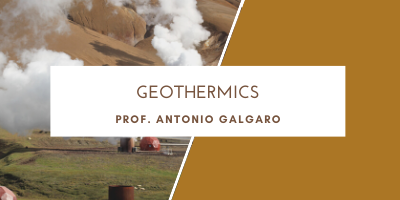Geothermics

Period: First Semester
Course unit contents: The course aims to deepen the application aspects of geothermal energy in relation to the following contents: thermo-physical properties of natural materials; relation between geothermal reservoirs and structural traps, geochemical and isotopic survey methodologies finalized to geothermal exploration, on site thermo-physical properties measurement methodologies. Examples of the exploration and use of endogenous heat, as well as the use of the subsurface as a heat source and receptor, will be described in detail by assessing in particular the geological competence in a highly multidisciplinary perspective.
Excursions in the geothermal construction site at various types of geoexchange plants under construction, and in Larderello Area (Tuscany) visiting the geothermal power plants of Enel Green Power Company excursion to thermal storage facilities underground.
The geothermal resource and the current energy framework. High and medium entalpia resources. National and international situation, scenarios and possible technical regulatory developments
• Fundamentals of thermophysics
• Thermophysical properties of materials, heat transmission mechanisms with emphasis on aspects of transitory conduction processes, flow and geothermal gradient. Endogenous heat, sources and energy assessments
• Subsurface classification, aquifers, soil permeability, wells and piezometers, surveys and other forms of detection. Hydrogeological aspects aimed at determining the characteristics of hydrothermal systems.
Exploration methods, geothermal drilling, geothermal reservoir characterization, geothermal reservoir simulation models, relationships between tectonic and geothermal assessment, unconventional geothermal resources, social, economic and environmental impact assessments.
Geothermal systems for air conditioning proposes with open groundwater and closed-circuit systems with wells and ground heat exchangers.
Types of ground heat exchangers, energy geo-structures (geo-foundations), introduction to thermal storage systems, underground thermal storage systems (ATES).
• The drilling site, the work realization of geothermal probes (open-air lesson - visit on site).
• Geothermal heat pumps, integration of geothermal air conditioning systems with other renewable sources and hybrid systems
• Closed-circuit ground heat exchange systems; examples of vertical probe sizing: procedure, parameters of influence, simplified analytical methods of sizing geothermal probes; The Ground Thermal Response Test. Theory, working hypotheses, operational modes, data analysis, instrumentation for the test with heat injection and heat extraction, measurement uncertainties, innovative experimental techniques and data analysis.
• Assessments of the undisturbed subsurface temperature and its relationship with the solar and endogenous sources. Time-variant analysis of ground probe relations.
• Open-loop systems with groundwater use, building criteria and well sizing; numerical models of hydro-thermal simulation of pick-and-return well systems
- applications of geothermal solution for space free cooling
- day and seasonal thermal storage in the underground matrix and in aquifers.
- The environmental component of geo-exchange, sustainability and renewable systems
• International, national, regional and local legislation on the use of geothermal resources.
Planned learning activities and teaching methods: The lessons will be frontal even with tests regarding the use of analytical and numerical codes calculation. There are some excursions to Italian geothermal fields and geothermal drilling sites.